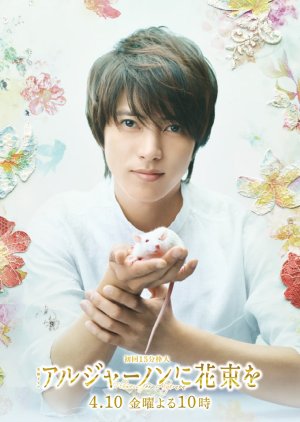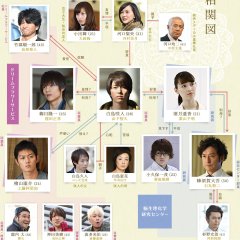 Meet the Writers of MDL
Meet the Writers of MDL Shiratori Sakuto lavora in una fioreria, è un giovane ragazzo di bell’aspetto ma con la mente di un bambino di sei anni. Per caso un giorno trova un piccolo topo scappato da un laboratorio e lo prende con sé. Di lì a poco una scienziata alla ricerca del topolino fuggito trova Sakuto e gli propone di prendere parte ad un grandioso progetto che lo farà diventare intelligente… (Fonte: MyDramaList) ~~ Tratto dal romanzo "Fiori per Algernon" di Daniel Keyes. Modifica la Traduzione
- Italiano
- Português (Brasil)
- Polski
- English
- Titolo Originale: アルジャーノンに花束を
- Conosciuto Anche Come: Flowers for Algernon , Fiori per Algernon
- Sceneggiatore: Nojima Shinji, Ikeda Natsuko
- Regista: Yoshida Ken, Sakai Masahiro, Matsuda Ayato
- Generi: Vita, Fantascienza, Medico
Cast & Ringraziamenti
- Yamashita Tomohisa Ruolo Principale
- Kuriyama Chiaki Ruolo Principale
- Kubota MasatakaYanagawa Ryuichi [Sakuto's colleague]Ruolo di Supporto
- Kudo AsukaHiyama Kosuke [Sakuto's colleague]Ruolo di Supporto
- KatsuyaDai Shikanai [Sakuto's colleague]Ruolo di Supporto
- Maeda GokiKanda Yuki [Sakuto's colleague]Ruolo di Supporto
Recensioni

I'm writing this few moments after finishing the last episode, while crying still, so forgive me if I'm not 100% rational and non biased. I can say for sure that this is one of the most emotional dramas I've ever seen. It's a beautiful story about friendship, love, human value, ethics and morals.
Although it's a sci-fi show, it totally reflects reality and behavior of human beings under certain circumstances and shows pretty realistic relationships between 'non equal' humans. For those who like psychology, there is a great deal of it in this show as well. For those who like character development, strong emotions, all mixed together, this drama is 100% must see.
I have no heart to criticize anything about this show at the moment, because I feel like I just got off the roller coaster of emotions I will never forget. Good points are too strong to let me pay attention to the minor flaws, so I'll just finish positively, like I started.
I don't know if I will be rewatching this, it feels like I won't forget it so soon, so maybe sometime in the future, and I'm sure I will equally enjoy it.
Once again, I hope the subs will be done soon, because it's a shame not to let everyone enjoy this amazing show till the end. Subs for Algernon, he deserves it <3
Questa recensione ti è stata utile?

Ironically, it had been sitting in my ptw list for a good year, waiting - so I thought - for me to be in the right mood for its somehow heavy subject. It came as a big surprise that this was the perfect moment and Algernon ni Hanataba wo is the show that finally reminded me why I fell in love with Asian dramas in the first place and became an addict so many years ago.
It enchanted me and pulled me into its world five minutes in. I hadn't even realized I was marathoning with bated breath until I exhaled.
The show is built on two different levels: the plot itself with its events and the story told by the characters. These two levels aren't of equal importance, that is, if you watch for the events it may disappoint you, as it suffers from the typical Japanese brevity and sudden, unexpected turns. However, this drama is meant to be valued for the thoughts it provokes and the way it does so, hence my perfect mark.
I won't lie, it made me cry. A lot.
This is a beautifully heart-wrenching story of diversity and the need to conform, be 'equal'. While most of us aim at being smart enough to earn more, have success in life and even wallow in our self-esteem, Sakuto dreams of becoming intelligent for the people around him to love him. This makes his journey all the more tragic, since it inevitably raises the question whether he was happier when only half cognizant of his surrounding or when he fully grasped the meaning of everyone's motivations and finds out that being a genius can be a sentence to loneliness. It also heavily probes on the benefits of intelligence when it's attained at the cost of humanity, empathy, compassion and even love.
I believe each single character in this drama has a precise purpose in terms of typecasting the different approaches to what is generally considered 'normal'. Here's a word I hate when referred to human beings, but it is the core of this tale, in its literal meaning of 'conforming to the norm'. This means that all the characters revolving around Sakuto find their justification only in connection with him, they represent the wide range of 'normality' as opposed to the extremes Sakuto's going to experience.
Which is not to say that they didn't act well. Quite the opposite: what fascinated me here is the fact that each actor played its part in a different way, according to his/her role in Sakuto's life. The same can be said about the direction, which plays a precise role too with its use of symbolism, archetypes, flowers, colours, camera focalization. Even Algernon is a great character. Tiny details are everything but irrelevant, a trait I always, highly appreciate.
And at the risk of being called biased, I maintain Yamashita's acting is impressive here. I was deeply moved by the sheer movement of his hand, the subtle, slow changes in stance, walk, gaze. I loved Sakuto as a viewer, as a woman, as a mother, as a sister, as a friend, to the point I desperately wanted to hug him and never let go. I could go on, but I'm becoming verbose and perhaps a little too emotional too.
The music is the only trait of the drama that gets a mere passing grade. I wish Japanese shows in general would put on their Osts the same amount of effort they spend on photography and characterization. The only song played here is very suitable to the story, but repetitive to the point of losing all its impact.
I've already rewatched many scenes soon after completing an episode. I simply couldn't help it. There's no doubt in my mind I'm going to re-watch the whole drama soon enough, certain it will lose none of its emotional impact on further viewing.
Questa recensione ti è stata utile?























































